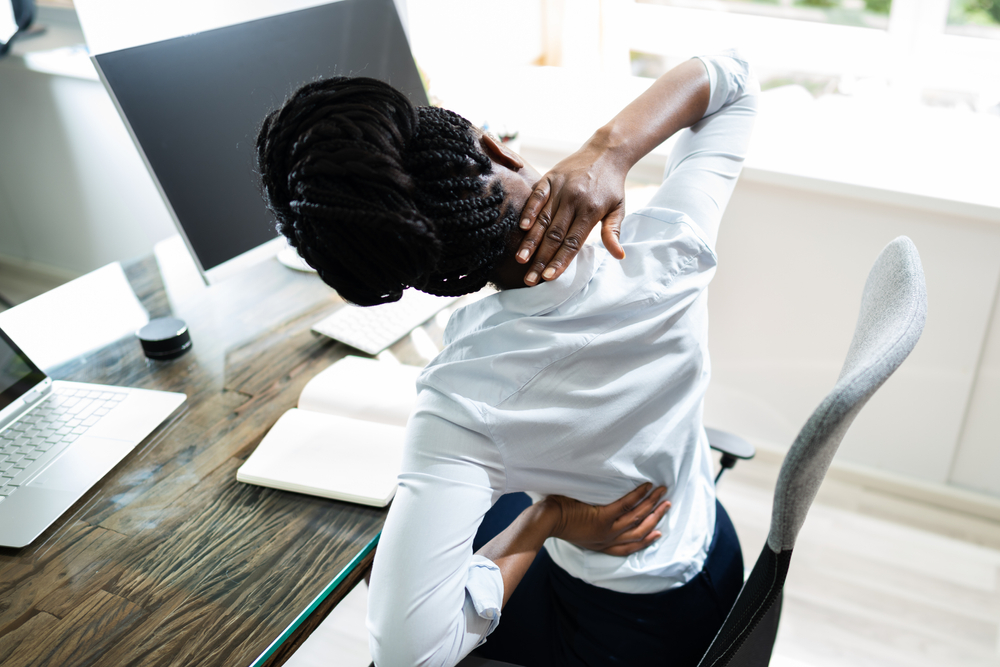You know that slouched position you fall into when you’re working at your computer, scrolling your phone, or binge-watching Netflix? That rounded shoulders, forward head, compressed chest posture that feels so natural after hours of sitting? It’s not just giving you a sore neck and back — it’s literally crushing your internal organs.
This posture mistake is so common that most people don’t even realize they’re doing it, but the effects go far beyond just looking hunched over. Your organs need space to function properly, and chronic slouching is squeezing them into positions that affect everything from your breathing to your digestion.
What happens when you slouch
When you slouch forward, your rib cage collapses inward and downward, dramatically reducing the space available for your lungs, heart, and other organs. Your diaphragm — the large muscle responsible for breathing — can’t expand fully when your chest is compressed.
This means you’re taking shallow breaths all day long, getting less oxygen to your brain and body. That afternoon fatigue you blame on lunch? It might actually be from oxygen deprivation caused by your posture.
Your heart also gets squeezed when your chest cavity shrinks. This can affect circulation and make your heart work harder to pump blood effectively throughout your body.
Your digestive system suffers too
Slouching doesn’t just affect your chest — it compresses your entire torso, including your stomach and intestines. When you’re hunched over, your organs get pushed and squeezed into unnatural positions that interfere with normal digestive processes.
That bloated feeling after meals? The acid reflux that seems to come out of nowhere? These could be directly related to your posture. When your stomach is compressed, it can’t expand properly to accommodate food, and stomach acid is more likely to back up into your esophagus.
Your intestines also need room to move and contract properly to process food. Chronic compression can slow down digestion and contribute to constipation, gas, and general digestive discomfort.
The domino effect on your nervous system
Poor posture doesn’t just crush your organs — it also affects your nervous system. When you slouch, you’re putting pressure on nerves that control various bodily functions. This can lead to headaches, dizziness, and even issues with concentration and mood.
Your vagus nerve, which controls many automatic functions like heart rate and digestion, can be affected by poor posture. This nerve runs from your brain down through your neck and chest, and compression from slouching can interfere with its signals.
The forward head posture that often accompanies slouching puts extra strain on your cervical spine and can compress nerves that control arm and hand function, leading to tingling, numbness, or weakness.
Why we keep doing it
The reason this posture mistake is so common is that it feels effortless in the moment. When you’re tired or focused on a screen, your body naturally gravitates toward this collapsed position because it requires less muscular effort to maintain.
Our modern lifestyle makes it worse. Hours of sitting at desks, looking down at phones, and lounging on couches all encourage this forward, rounded posture. Your muscles adapt to these positions, making good posture feel uncomfortable and unnatural.
The problem is that what feels easy in the short term is causing serious damage over time. Your body wasn’t designed to be compressed for hours every day.
Signs your organs are being affected
You might not realize your posture is affecting your organs, but your body gives you clues. Frequent shortness of breath, especially when sitting, could indicate that your lungs aren’t getting enough room to expand.
Digestive issues like bloating, acid reflux, or constipation that seem to have no obvious cause might be related to organ compression. Chronic fatigue despite adequate sleep could be from poor oxygen intake due to restricted breathing.
If you notice these symptoms improve when you stand up and stretch, your posture is likely contributing to the problem.
How to fix the damage
The good news is that improving your posture can quickly relieve pressure on your organs. Start by setting reminders to check your posture throughout the day. Imagine a string pulling you up from the top of your head.
Strengthen your back muscles and stretch your chest muscles to counteract the forward collapse. Simple exercises like wall push-ups, doorway chest stretches, and rows can help restore proper alignment.
Consider your environment too. Adjust your computer screen to eye level, hold your phone higher, and invest in ergonomic furniture that supports good posture rather than encouraging slouching.
The immediate benefits
When you improve your posture, you’ll notice changes quickly. Deeper breathing happens almost immediately when you open up your chest. Digestive issues often improve within days of better posture habits.
Your energy levels will likely increase as your organs get the space they need to function properly. Even your mood might improve as better posture allows for better circulation and nerve function.
Bottom line? That slouched position might feel comfortable, but it’s slowly crushing your internal organs and affecting your health in ways you never imagined. Simple posture corrections can give your organs the space they need to keep you feeling your best.


















